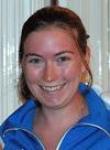Van Horn, Christine

Christine is in the Molecular Biology IDP. She joined the training program in 2012. Her research mentor is Dr. Michael Teitell. She received a B.A. degree in 2008 from UC Berkeley.
Mentor: Dr. Michael Teitell
Human pluripotent stem cells (hPSCs) have immense potential to improve therapeutics and the development of disease models for regenerative medicine, but there is still much to be learned at a basic level about the regulation of self-renewal and differentiation. Research in the Teitell Lab and other groups has made it increasingly clear that metabolism is a key determinant for hPSC differentiation or self-renewal in cell culture. Recently, we published that UCP2, a mitochondrial protein that regulates access of substrates to the TCA cycle, must be repressed during hPSC differentiation to allow a shift from glycolytic to oxidative metabolism. My project builds on this prior work and aims to further understand the role for metabolism in regulating hPSC self-renewal and differentiation. I am currently studying LRH-1 as a candidate gene that regulates hPSC metabolism and self-renewal. LRH-1 is a nuclear hormone receptor that has been implicated in somatic cell reprogramming, differentiation, and metabolic regulation. Our hypothesis is that activation of LRH-1 can promote self-renewal or differentiation depending on the context of the cell, and that this feature can be manipulated to improve somatic cell reprogramming or differentiation of hPSCs into specific lineages. I am also identifying potential upstream regulators of UCP2 that facilitate metabolic regulation of stem cell self-renewal. An improved understanding of the interconnections between hPSC fate and metabolism has the potential to improve current differentiation techniques as well as promote the goals of the emerging field of regenerative medicine.


